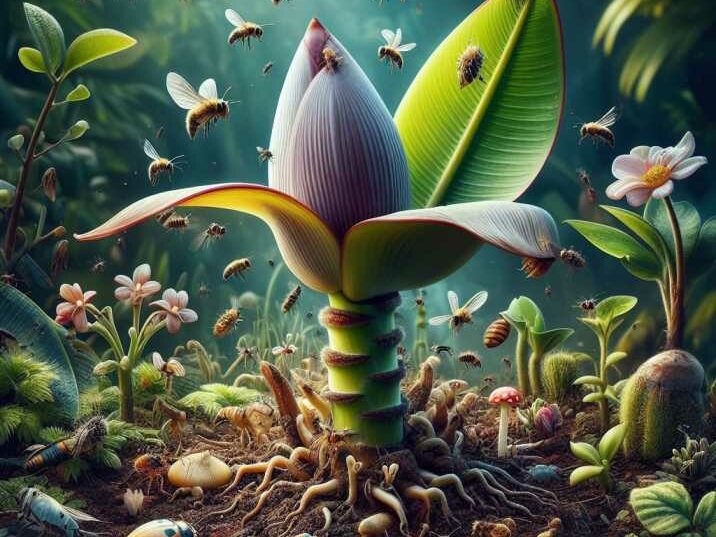Introduction:
Table of Contents
When nurturing baby banana plants, one of the biggest challenges is managing pests without resorting to harmful chemicals. These delicate plants require special care and protection against various pests that can hinder their growth. In this comprehensive guide, we’ll explore effective and natural ways to control pests affecting baby banana plants, ensuring their health and vitality without compromising on safety.

How you control pests affecting baby banana plants without chemicals?
Understanding Common Pests Affecting Baby Banana Plants Pests can wreak havoc on baby banana plants if left unchecked. From aphids to mealybugs, each pest poses a unique threat to the plant’s health and growth. Understanding the common pests affecting baby banana plants is the first step towards effective pest management.
Beneficial Insects: Nature’s Pest Control Nature provides us with an array of beneficial insects that can help control pests in our gardens. Introducing these natural predators to your banana plant environment can significantly reduce pest populations without the need for chemicals.
Neem Oil: A Natural Pest Repellent Derived from the seeds of the neem tree, neem oil is a potent natural insect repellent. Its ability to disrupt the growth and reproduction of pests makes it an effective solution for controlling pests affecting baby banana plants.
Homemade Pest Sprays Homemade pest sprays using ingredients like garlic, chili peppers, and soap can be an effective and safe way to control pests on baby banana plants. These natural sprays are easy to make and can help keep pests at bay without harming the plants or the environment.
Companion Planting for Pest Control Companion planting involves strategically planting certain species together to enhance growth and deter pests. Utilizing companion plants like marigolds, basil, and mint around baby banana plants can help repel pests and promote overall plant health.
Physical Barriers and Traps Creating physical barriers and using traps can help protect baby banana plants from pests. Techniques such as wrapping stems with sticky tape or installing row covers can prevent pests from reaching the plants, reducing their impact without the use of chemicals.
Cultural Practices for Pest Prevention Implementing proper cultural practices can go a long way in preventing pest infestations on baby banana plants. Techniques such as regular pruning, proper watering, and maintaining soil health create an environment less favorable for pests to thrive.
Organic Fertilization for Stronger Plants Healthy plants are better equipped to withstand pest attacks. Using organic fertilizers rich in essential nutrients can strengthen baby banana plants, making them more resilient to pests and environmental stressors.
Importance of Monitoring and Early Detection Regular monitoring and early detection of pest problems are crucial for effective pest management. By closely observing your baby banana plants for signs of pest damage, you can intervene promptly and prevent infestations from escalating.
Integrated Pest Management (IPM) Approach Integrated Pest Management (IPM) is a holistic approach to pest control that combines various strategies to minimize the use of chemicals. By incorporating IPM principles into your banana plant care routine, you can effectively manage pests while prioritizing environmental sustainability.
Conclusion:
Protecting baby banana plants from pests without resorting to chemicals is not only possible but also beneficial for the environment and your overall garden health. By implementing natural pest control methods like beneficial insects, homemade sprays, and cultural practices, you can ensure the well-being of your banana plants while minimizing harm to the ecosystem. Remember, a healthy garden starts with mindful and sustainable practices that prioritize the harmony between plants, pests, and the environment.
Table of Information:
| Subtopic | Key Insights |
|---|---|
| Understanding Common Pests | Identify common pests such as aphids, mealybugs, and spider mites affecting baby banana plants. |
| Beneficial Insects | Learn about beneficial insects like ladybugs, lacewings, and predatory mites that can help control pest populations. |
| Neem Oil | Discover the benefits of neem oil as a natural insect repellent and its effectiveness in controlling pest infestations. |
| Homemade Pest Sprays | Explore DIY pest spray recipes using household ingredients to safely deter pests from baby banana plants. |
| Companion Planting | Understand the concept of companion planting and its role in repelling pests and promoting plant health. |
| Physical Barriers and Traps | Learn about physical barriers and traps that can be used to protect baby banana plants from pest damage. |
| Cultural Practices | Implement cultural practices like pruning and proper watering to create a pest-resistant environment for banana plants. |
| Organic Fertilization | Discover the importance of organic fertilization in strengthening baby banana plants against pest attacks. |
| Monitoring and Early Detection | Understand the significance of regular monitoring and early detection in preventing pest infestations. |
| Integrated Pest Management Approach | Explore the principles of Integrated Pest Management and how they can be applied to control pests in banana plants. |
FAQs:
- How do you control pests affecting baby banana plants without chemicals?
- By utilizing natural pest control methods such as beneficial insects, homemade sprays, and cultural practices.
- What are some common pests that affect baby banana plants?
- Common pests include aphids, mealybugs, spider mites, and banana weevils.
- Can companion planting help deter pests from baby banana plants?
- Yes, companion plants like marigolds, basil, and mint can help repel pests and promote plant health.
- Is neem oil an effective natural insect repellent for banana plants?
- Yes, neem oil is known for its ability to disrupt the growth and reproduction of pests, making it an effective solution.
- How important is early detection in controlling pest infestations on banana plants?
- Early detection is crucial as it allows for prompt intervention and prevents pest infestations from escalating.
